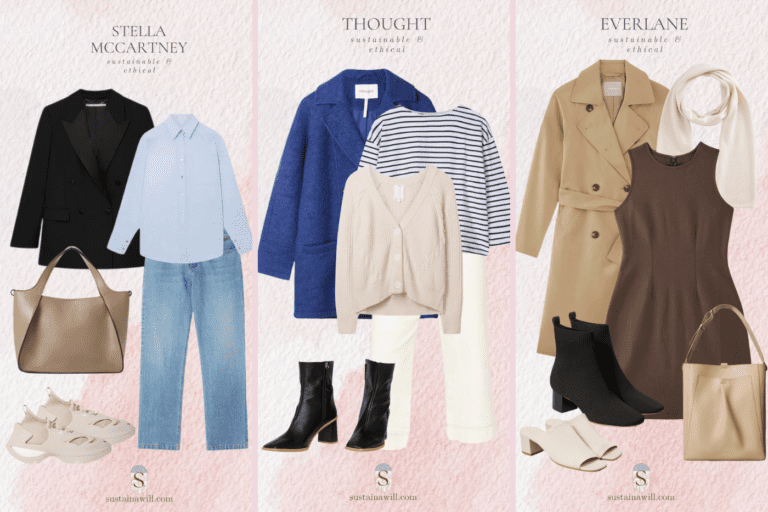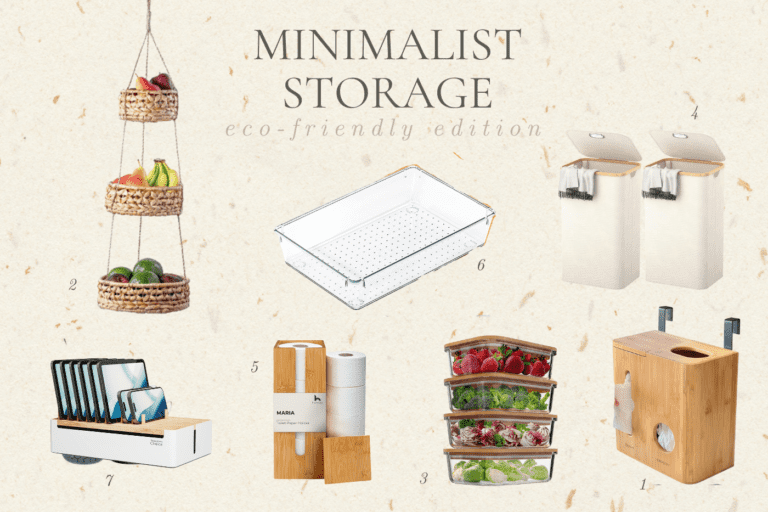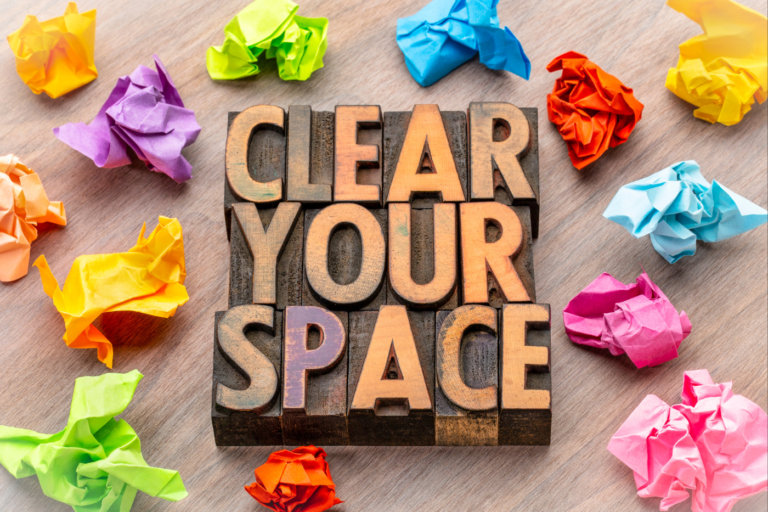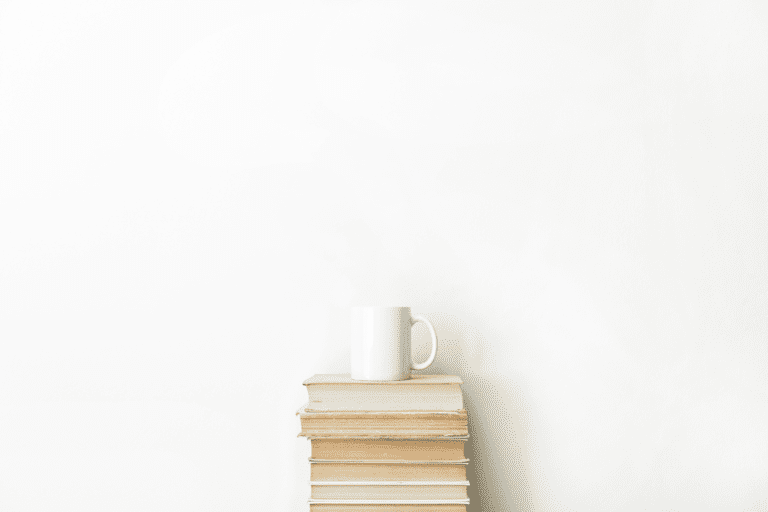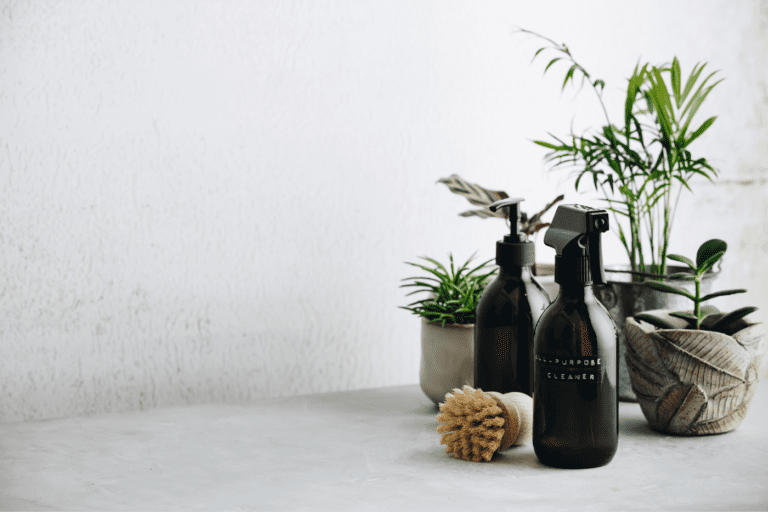Curious about the allure of Minimalism in 2024? Ever wondered if a simpler, intentional life could be the antidote to our cluttered existence?
Join us as we explore the intriguing pros and cons of Minimalism, addressing common pain points like letting go of sentimentality and adjusting to a less consumer-driven mindset.
Our journey promises insights that not only embrace the beauty of simplicity but also equip you with the tools to navigate the challenges on your path to a purposeful life. Ready to uncover the secrets of a minimalist 2024? Let’s dive in.
Super Short Definition of Minimalism
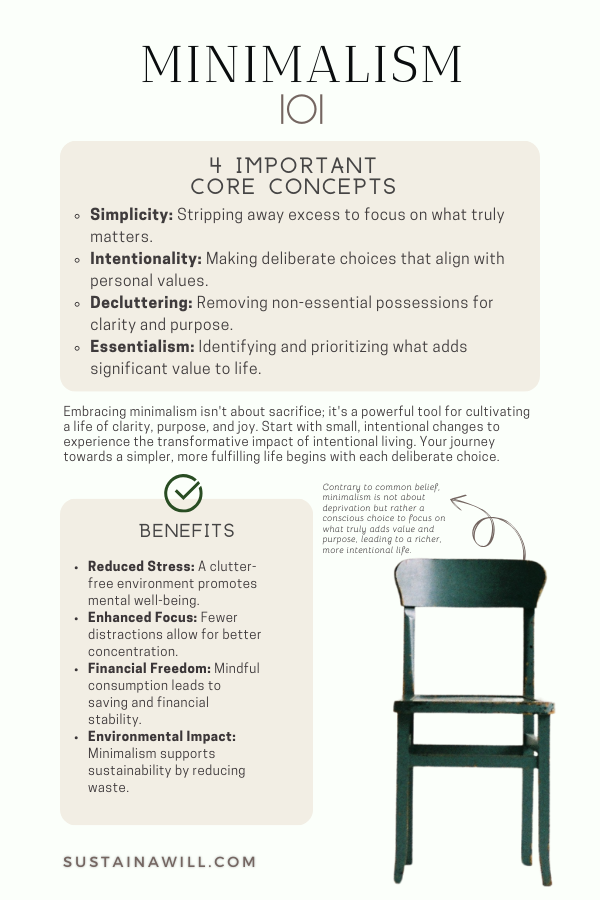
Minimalism: A lifestyle embracing intentional simplicity, where one focuses on what truly adds value while shedding excess possessions, distractions, and commitments for a more purposeful and fulfilling existence.
- Purposeful Ownership: Embrace items and experiences that bring true value and joy.
- Simplified Environment: Create spaces free from unnecessary clutter, promoting mental clarity.
- Mindful Consumption: Shift focus from quantity to quality, fostering a more conscious and sustainable lifestyle.
- Intentional Living: Prioritize meaningful relationships and activities, cultivating a purpose-driven life.
- Reduced Stress: Minimize decision fatigue and overwhelm by streamlining daily choices.
In essence, minimalism is a mindful approach to living that seeks to enhance well-being by decluttering both physical and mental spaces.
Pros and Cons of Minimalism
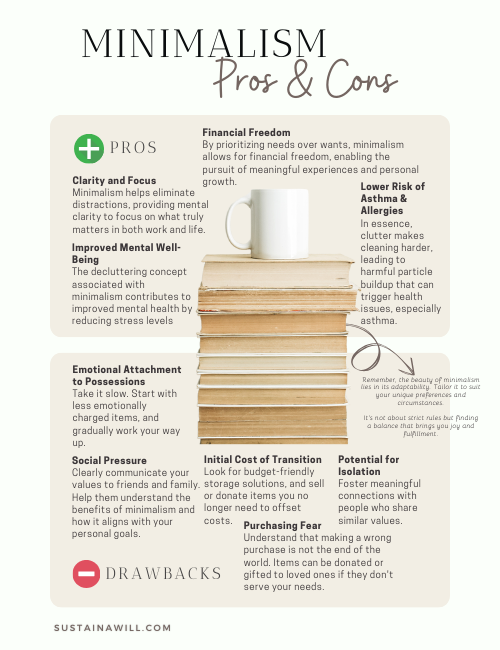
What are the Pros of Minimalism?
1. Clarity and Focus
- Explanation: Minimalism helps eliminate distractions, providing mental clarity to focus on what truly matters in both work and life.
- Example: Organizing your computer desktop and limiting open tabs to essential tasks ensures a clean digital workspace, allowing for efficient task execution and heightened productivity.
2. Financial Freedom
- Explanation: By prioritizing needs over wants, minimalism allows for financial freedom, enabling the pursuit of meaningful experiences and personal growth.
- Example: Adopting a minimalist shopping approach, where you create a list of essential purchases and avoid impulsive buys, frees up funds for experiences like a weekend getaway or investing in a new skill.
3. Reduced Stress
- Explanation: A minimalist approach reduces the mental burden of choices, leading to less stress and a more relaxed daily routine.
- Example: Creating a simplified capsule wardrobe with versatile, mix-and-match items minimizes decision fatigue, making mornings less stressful and promoting a calmer start to your day.
4. Enhanced Relationships
- Explanation: Minimalism encourages the prioritization of relationships, fostering deeper connections through quality time and shared experiences.
- Example: Embracing a minimalist social calendar by consciously selecting and committing to events allows you to spend more quality time with loved ones, strengthening your relationships.
5. Environmental Impact
- Explanation: Minimalism aligns with environmental values, advocating for conscious consumption and minimizing the ecological footprint.
- Example: Choosing reusable and sustainable alternatives, such as using a stainless steel water bottle instead of single-use plastic, reduces waste and contributes to a more eco-friendly existence.
6. Increased Mindfulness
- Explanation: Minimalism promotes a mindful approach to possessions, encouraging appreciation for what you have and reducing the impulse to accumulate.
- Example: Practicing mindful consumption by savoring each bite during meals, free from distractions, fosters a deeper connection with your food and promotes a mindful eating experience.
7. Improved Mental Well-Being
- Explanation: Minimalism extends beyond the physical, addressing emotional well-being by promoting detachment from material possessions and fostering a more positive outlook.
- In addition, the decluttering concept associated with minimalism also contributes to improved mental health by reducing stress levels:
In a recent study looking at how people feel about their homes and how this affects their well-being, researchers analyzed 60 couples and the way they perceive their homes.
The findings were fascinating – couples that perceived and described their homes as cluttered or unfinished were associated with higher stress levels, leading to flatter cortisol slopes (a marker of potential health issues).
On the flip side, homes adorned with restful and nature-related words were linked to lower stress and improved mood, showcasing the power of a more minimalistic and serene living environment.
For those interested in delving into the details, the study can be explored here.
8. Sustainable Happiness
- Explanation: Minimalism shifts the focus from material possessions to experiences, fostering a more sustainable and lasting sense of happiness. You’ll find joy in the simplicity of life, appreciating the meaningful moments and connections that contribute to long-term well-being.
9. Lower Risk of Asthma & Allergies
- Explanation: Too much clutter isn’t just about a messy home – it seriously impacts your health. Clutter attracts dust mites, pet dander, and cockroaches, worsening air quality.
Dust in clutter contains harmful substances from outdoor pollution, and the bacteria shed endotoxins linked to higher asthma rates. Longer exposure increases the risk.
In essence, clutter makes cleaning harder, leading to harmful particle buildup that can trigger health issues, especially asthma.
The Environmental Protection Agency warns that indoor air pollution, responsible for 50% of illnesses, is a significant concern. A cluttered home acts as a container for pollution, concentrating it and therefor potentially causing health problems. Keeping things tidy and decluttered isn’t just about appearances; it’s about breathing cleaner air. Source
In essence, minimalism offers a roadmap to a more intentional and fulfilling life, where these specific everyday acts of simplicity become the key to unlocking various aspects of well-being.
What are the Cons of Minimalism?
Remember, like any lifestyle choice, minimalism isn’t a one-size-fits-all solution. Let’s explore some potential drawbacks and how to navigate them:
1. Emotional Attachment to Possessions
Letting go of sentimental items can be emotionally challenging.
- Overcome: Take it slow. Start with less emotionally charged items, and gradually work your way up. Consider taking photos of sentimental objects to preserve the memories without the physical clutter.
2. Social Pressure
Social norms may pressure you to have more possessions or a larger living space.
- Overcome: Clearly communicate your values to friends and family. Help them understand the benefits of minimalism and how it aligns with your personal goals. Surround yourself with like-minded individuals who support your choices.
3. Initial Cost of Transition
Decluttering might require initial investments in storage solutions or replacements for multi-functional items.
- Overcome: Plan your transition. Gradually replace items as they wear out or become unnecessary. Look for budget-friendly storage solutions, and sell or donate items you no longer need to offset costs.
4. Limited Personalization
Minimalist spaces can sometimes feel impersonal or sterile.
- Overcome: Introduce personal touches strategically. Focus on quality over quantity, selecting a few meaningful decorations or items that bring joy. Choose versatile, timeless pieces that reflect your personality.
5. Misunderstanding of Minimalism
Others may misunderstand minimalism as mere frugality or asceticism.
- Overcome: Educate others about the true essence of minimalism. Emphasize that it’s about intentional living and prioritizing what truly matters, rather than a strict focus on deprivation. Share success stories and the positive impact on your life.
6. Potential for Isolation
A minimalist lifestyle might lead to social isolation if not managed carefully.
- Overcome: Foster meaningful connections with people who share similar values. Engage in activities that don’t revolve around material possessions, like outdoor adventures, game nights, or volunteer work. Balance minimalism with social interactions to maintain a healthy and fulfilling lifestyle.
7. Adaptation Challenges
Adjusting to a minimalist lifestyle may take time and effort.
- Overcome: Be patient with yourself. Gradual changes are more likely to stick. Celebrate small victories and acknowledge the positive impact minimalism has on your life. Surround yourself with supportive communities or online forums for encouragement and advice.
8. Purchasing Fear
Constantly worrying about making the wrong purchases or accumulating unnecessary items can be a common challenge in minimalism.
- Overcome:
- Shift Perspective: Understand that making a wrong purchase is not the end of the world. Items can be donated or gifted to loved ones if they don’t serve your needs.
- Buy with Intention: Only make purchases if you genuinely believe you need the item. Consider its utility and how it aligns with your lifestyle.
- Celebrate Learning: View less-than-ideal purchases as learning experiences. Recognize that your journey towards intentional buying is a continuous process.
9. Heightened Sensitivity to Clutter
Becoming more sensitive to clutter can be overwhelming, especially when it starts affecting your peace of mind.
- Overcome:
- Invest in Organizers: Purchase organizers, bins, and storage solutions to reduce the visual impact of clutter. Having designated spaces for items can create a tidier appearance.
- Systematic Decluttering: Instead of removing a large amount at once, systematically declutter small sections. This way, the process is more manageable and less overwhelming.
- Tolerance Training: Gradually expose yourself to a reasonable amount of inevitable everyday clutter, such as children’s toys. This helps build tolerance and reduces the perceived impact of minor messes.
Remember, the beauty of minimalism lies in its adaptability. Tailor it to suit your unique preferences and circumstances. It’s not about strict rules but finding a balance that brings you joy and fulfillment.
Are Minimalists happier?

Absolutely, yes!
Why?
In the realm of minimalism, less truly is more. By paring down the unnecessary and focusing on what brings genuine joy and purpose, minimalists often find themselves leading happier lives. Here’s the breakdown:
- Less Clutter, More Calm: Simplifying your living space can lead to a more serene and organized environment, reducing stress and promoting a sense of calm.
- Freedom from Consumerism: Minimalism encourages a shift away from the constant pursuit of more stuff. Breaking free from consumer-driven habits can lead to a greater appreciation for what you already have.
- Emphasis on Experiences: Minimalists prioritize experiences over possessions. Investing time and energy in meaningful activities and relationships often results in a more fulfilling and satisfying life.
- Clearer Mindset: Cutting out the excess allows for a clearer mental space. Minimalists often report enhanced focus, better decision-making, and a greater sense of purpose.
Moreover, recent research supports the connection between minimalism and happiness:
A study led by Joshua Hook of the University of North Texas found that over 80% of studies on the topic reported a positive relationship between voluntary simplicity (aka minimalism) and well-being.
For instance, a study led by Kirk Brown of the University of Rochester in 2005 discovered that voluntary simplifiers (minimalists) exhibited more positive emotion and well-being than control participants.
This consistent trend was found across both quantitative and qualitative research designs, suggesting a robust link between minimalism and psychological well-being.
For a deeper dive into this research, check out Psychology Today. So, yes to minimalism – it’s not just about having less; it’s about gaining more of what truly matters. 🌈
Conclusion
In wrapping up our exploration of the pros and cons of minimalism in 2024, it’s clear that this lifestyle offers a compelling path to a simpler, intentional existence. The benefits, from decluttered spaces to enhanced mental peace, are evident.
However, minimalism isn’t without its challenges. It’s not a universal solution, and finding your balance is key.
As you reflect on our discussion, consider this: Where in your life could minimalism alleviate stress and bring more joy? Take a small step today, whether it’s decluttering a space or reassessing priorities.
Minimalism isn’t about deprivation but creating space for what truly matters. So, seize the opportunity in 2024 to simplify and find more fulfillment. Ready to start? Your journey to a more intentional life begins now. 🌿



